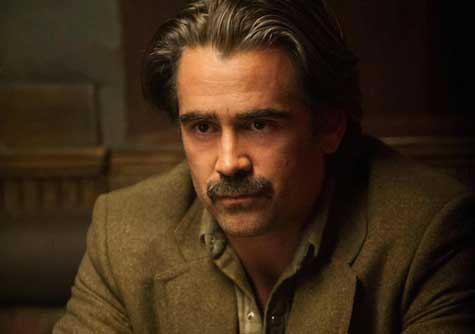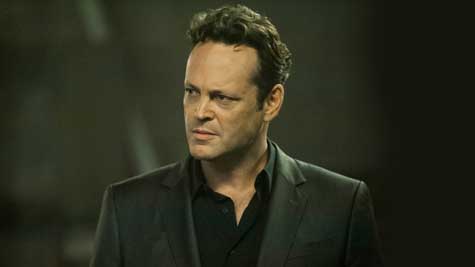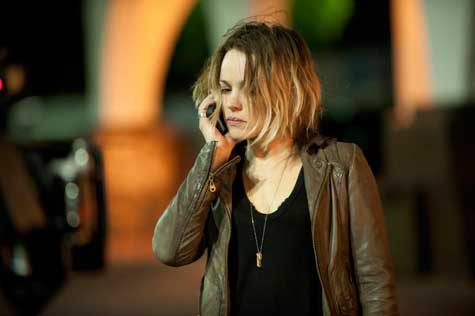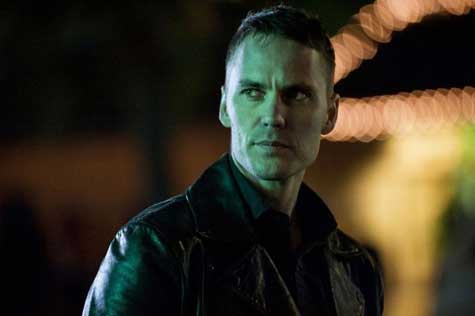
The second season of True Detective moves to California with an all new cast, keeping the grim sense of despair but losing the mysticism and existential dread that piqued the interest of so many viewers in its first season. Without Rust Cohle’s Thomas Liggotti-inspired philosophical ramblings, the primordial swamp of the Louisiana scenery, and the moody direction of Cary Joji Fukunaga (who does stay on board as producer), the show feels different, but not necessarily worse, as it gains focus and tells a somewhat more straightforward narrative.
Instead of a pair, we get a trio of detectives this time around, beginning with Colin Farrell’s Ray Velcoro, a big fish in the very small, corrupt pond of Vinci, a city—“supposedly,” Ray says—that seems to consist entirely of a sweatshop, some oil refineries, dead-end bars, and a casino. If you thought Thompson’s Pop. 1280 was small town, Vinci has 94 people, and they’re all squeezing the Federal orange for every drop.
Ray is the prototypical TV noir cop: divorced, drunk, dirty. He sold his soul long ago, but still wants to save his son, a chubby freckled bully magnet who may not even be his blood. The episode opens with Ray speaking to a lawyer, explaining how he wants more visitation, and we learn that his wife was raped and brutalized while he was a beat cop, and they “think” she was pregnant when it happened, but a paternity test was never performed. We see Ray’s fall from grace, when local crime kingpin Frank Semyon, played by Vince Vaughn, offers him the ID of his wife’s rapist. Ray hesitates for a half second before taking the photo, and presumably going off to mete out vengeance. Later, he learns that his son is being bullied, and goes to the bully’s house to brass-knuckle his Dad in front of him and take his own self-loathing out on the man.

A lot is going on—earlier in the day, at the behest of Frank, Ray beats up a reporter doing an exposé on Vinci’s web of corruption, —and unfortunately, the show feels longer than it is. Justin Lin (The Fast and the Furious franchise) directs the first episode, and does a decent job, except for a few scenes where the actors seem to be rehearsing. The moodiness of Season 1 is sorely missed. Frank is just as important as the detectives, now that he’s a kingpin aiming for legitimacy, buying up land around the new California Rail Corridor. Except the town manager, Caspere, has gone missing. (Get it? Casper the ghost?) Semyon is Russian for Simon, and simony is buying absolution, and that’s what Frank’s trying to do with this deal, to “create an old California family who can’t even remember where the money came from.” But with Caspere missing, he’s in big trouble.

The second detective is Ani Bezzerides, whose name is even more loaded with portent. Her full name is Antigone—the daughter of Oedipus—and her last name is a nod to noir screenwriter A.I. Bezzerides, who wrote They Drive By Night and adapted Spillane’s Kiss Me Deadly. We meet her storming out of her bedroom, because her man is squicked by whatever she wanted him to do; she has a pegboard festooned with tactical knives, carries at least three at all times (a belt push dagger, a folder, and a kerambit in her boot, in case you were wondering), and Rachel McAdams brings great naturalism to the role. She busts what she thinks is a brothel for human trafficking and finds the women are all webcam performers, all legit, with a business license… including her sister, Athena. Despite her green hair and fishnets, she seems less troubled than her big sister, who apparently has a complex about saving her. A tip on a missing person leads Ani to her father’s spiritual retreat, the Panticapaeum Institute (named after the Greek city, where a father committed suicide after his son turned on him, who knows if that foreshadows anything).
David Morse plays her prophet papa in Moses-style beard and flowing locks, telling his seekers, “only God’s eyes see truth in this meaningless universe.” Their argument over Athena’s “performances” is the best scene of the episode, as we are perhaps played against trope. We’re supposed to expect him to be a phony or worse, but he tells his daughter exactly what her issue appears to be, that she’s rebelling against a rebel by joining the forces of order, and trying to save a sister who really doesn’t look like she needed saving. Less impressive is seeing her later in the episode, drinking heavily, another troubled, divorced, hard-drinking cop.

Detective Three is Taylor Kitsch’s Paul Woodrugh, a highway patrol motorcycle cop, who pulls over a Lindsay Lohan-alike starlet with an anklet monitor, and who also accuses him of offering to make her problems go away in trade for sex, when it was she who actually made the suggestion. Kitsch plays Woodrugh with restrained fury. He’s a vet of “Black Mountain,” a merc company that fought in the desert, which seems to be a Blackwater reference. He gets put on administrative leave, rides home to his hot girlfriend, and chomps a Viagra so he can perform. He doesn’t drink, but he’s a deathwish junkie, and finds the Body of the Season while driving his motorbike 100 mph with the headlights off.
The black Cadillac with the passenger wearing sunglasses that we’ve seen in interstitial scenes (between the cuts and between the many characters) deposits its cargo at a picnic table in Ventura out on the Pacific Coast Highway, and our three police meet there. No antlers this time, though there was a raven head, rather like the Maltese Falcon, briefly seen in the Cadillac. And our victim has no eyes, like Oedipus, father of Antigone. It’s Caspere, the man upon whom Semyon’s fortune depends, and as Velcoro, Bezzerides, and Woodrugh eye each other warily, three messed-up cops who seem to know they will be thrown at this case that no one wants to deal with, the camera pulls away off the coast.
The critics have their knives out, as a lot of this is a bit over the top, but I found that I enjoyed it for what it was: a dark, Ellroy-inspired look at California corruption. There’s a bit of pulp to the characters with their hinting names and rent souls, but it didn’t bother me. I can poke fun at it and enjoy it at the same time, and I have to, because there’s not a laugh in this story until Episode 3, when a cliffhanger is resolved in such a bizarre, Lynchian fashion that I wasn’t sure if Nic Pizzolatto was flipping me the bird. The first season gave me high hopes, and I wasn’t satisfied with the ending. This one doesn’t seem to aim quite so high (no Lovecraftian hints of Yellow Kings as yet) and while it doesn’t generate as much anticipation as the first, it delivers a straightforward gritty narrative that is unrelenting. For some, that’s what they’ve been waiting for. Personally, if I may reference The Wire, I need a little Lester Freamon with my Kima, Bunk, and McNulty. Hard-drinking, messed-up cops can be interesting, but without foils, they can descend into caricature. And unless Episode 4 is a surprise, that may be what happens here.
Thomas Pluck is the author of the World War II action thriller Blade of Dishonor, Steel Heart: 10 Tales of Crime and Suspense, and Hot Rod Heart: A Noir Novelette. He is also the editor of the anthology Protectors: Stories to Benefit PROTECT and hosts Noir at the Bar in Manhattan. His work has appeared in The Utne Reader, PANK Magazine, McSweeney's Internet Tendency, Hardboiled, Needle: A Magazine of Noir, Crimespree, and numerous anthologies, including the upcoming Dark City Lights, edited by Lawrence Block. You can find him online and on Twitter as @thomaspluck.
Read all of Thomas Pluck's articles for Criminal Element.
